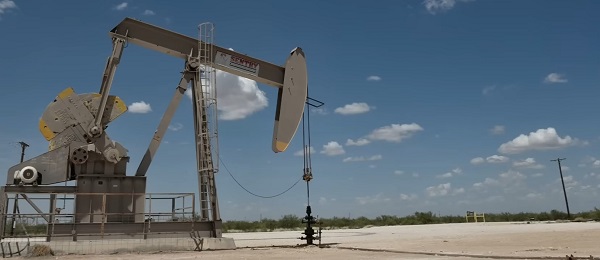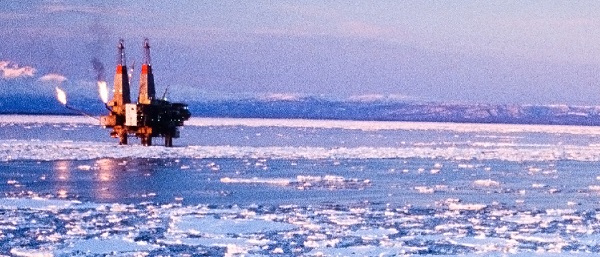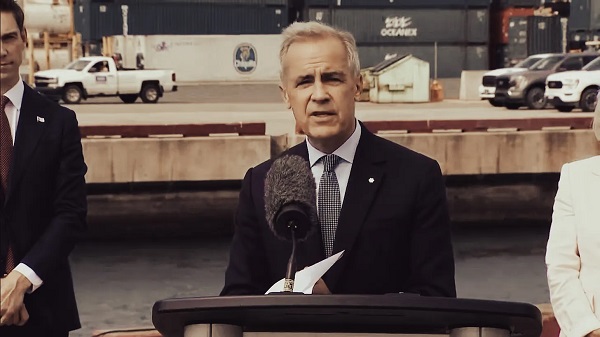Energy
Did the Environment Minister announce the end of Alberta’s Oil and Gas Industry at COP 27?

Steven Guilbeault (center) arrested after climbing the CN Tower for a Greenpeace protest on July 16, 2001.
PHOTO BY AARON HARRIS/THE CANADIAN PRESS
News Release From the Alberta Institute
Stop The Federal Cap On Oil And Gas
This week, Environment and Climate Change Minister, Steven Guilbeault, effectively announced the end of Alberta’s oil and gas industry.
In Egypt, at COP27, he announced that his government will cap oil and gas sector emissions from the end of next year, and work to reduce them after that.
Remember, even Justin Trudeau said that no country would find 173 billion barrels of oil in the ground and just leave them there.
But that, of course, was before he was Prime Minister.
Radical environmental activist Steven Guilbeault does believe we should leave 173 billion barrels of oil in the ground.
Now, yes, technically, he said he would cap and reduce emissions, not oil and gas production, and some energy companies are confident they can find efficiencies to allow them to continue producing some oil and gas without increasing emissions.
But anyone who’s been in the game long enough has seen the goalposts moved often enough to recognize another goalpost shifting when they see it, and that’s exactly what happened today.
How so?
Well, you would think Minister Guilbeault’s friends in the eco-activist industry – the same people who just a few years ago were calling for this cap on emissions – would be happy about this week’s announcement, wouldn’t you?
But no, these same people who were calling for exactly this policy just a few years ago actually attacked his announcement.
They think that this week’s announcement – the policy they were calling for until recently – is woefully inadequate.
They now want, you guessed it, a cap on production.
They don’t actually care about the level of carbon emissions, they don’t actually care whether emissions go down, they want the amount of oil and gas producedto go down.
This, fellow Albertans, is what Alberta is up against.
The radical eco-activist environmental movement doesn’t want Alberta’s oil and gas industry to be more environmentally friendly, they want Alberta’s oil and gas industry to die.
Meanwhile, having shifted the goalposts a dozen times already – the federal government’s environmental policies are as close to a complete ban on oil and gas as you can get, without actually banning it.
One more goalpost shift, and it will be an outright ban.
The environmental groups are pushing for that last final goalpost shift.
And Albertans are just supposed to trust the federal government that, despite all the previous times they shifted the goalposts, this time they definitely won’t.
The time to stand up for Alberta, and stand up for Albertans is now.
If we don’t do so right now, it might be too late.
In the 1980s, Alberta Premier, Peter Lougheed, fought for – and won – an amendment to the Canadian Constitution – Section 92A – that gave Alberta (and the other Provinces) the exclusive right to explore, develop, conserve, and manage their natural resources.
This amendment made clear that these resources belonged to the Provinces, not the federal government, and Alberta would not have signed on to the Constitution had that clause not been included.
Justin Trudeau and Steven Guilbeault do not believe in that clause in the Canadian Constitution.
They have already ignored it many times, and intend to continue to ignore it.
Justin Trudeau’s view is that Alberta can do whatever we want with our resources… as long as whatever we want to do is exactly what the federal government wants us to do.
And the federal Minister of Environment and Climate Change’s view is that we should leave them in the ground – all of them.
Enough is enough.
Now is the time for every Albertan – and the Alberta government – to stand up to the federal government.
If you agree, please join our campaign to stop the federal cap on oil and gas:
Please also consider forwarding this email to your friends, family, colleagues, and every Canadian.
Regards,
The Alberta Institute Team
Energy
The IEA’s Peak Oil Fever Dream Looks To Be In Full Collapse


From the Daily Caller News Foundation
U.S. Energy Secretary Chris Wright warned International Energy Agency (IEA) head Fatih Birol in July that he was considering cancelling America’s membership in and funding of its activities due to its increasingly political nature.
Specifically, Wright pointed to the agency’s modeling methods used to compile its various reports and projections, which the Secretary and many others believe have trended more into the realm of advocacy than fact-based analysis in recent years.
That trend has long been clear and is a direct result of an intentional shift in the IEA’s mission that evolved in the months during and following the COVID pandemic. In 2022, the agency’s board of governors reinforced this changed mission away from the analysis of real energy-related data and policies to one of producing reports to support and “guide countries as they build net-zero emission energy systems to comply with internationally agreed climate goals” consistent with the Paris Climate Agreement of 2016.
Dear Readers:
As a nonprofit, we are dependent on the generosity of our readers.
Please consider making a small donation of any amount here.
Thank you!
One step Birol and his team took to incorporate its new role as cheerleader for an energy transition that isn’t actually happening was to eliminate the “current policies” modeling scenario which had long formed the base case for its periodic projections. That sterile analysis of the facts on the ground was replaced it with a more aspirational set of assumptions based on the announced policy intentions of governments around the world. Using this new method based more on hope and dreams than facts on the ground unsurprisingly led the IEA to begin famously predicting a peak in global oil demand by 2029, something no one else sees coming.
Those projections have helped promote the belief among policymakers and investors that a high percentage of current oil company reserves would wind up becoming stranded assets, thus artificially – and many would contend falsely – deflating the value of their company stocks. This unfounded belief has also helped discourage banks from allocating capital to funding exploration for additional oil reserves that the world will almost certainly require in the decades to come.
Secretary Wright, in his role as leading energy policymaker for an administration more focused on dealing with the realities of America’s energy security needs than the fever dreams of the far-left climate alarm lobby, determined that investing millions of taxpayer dollars in IEA’s advocacy efforts each year was a poor use of his department’s budget. So, in an interview with Bloomberg in July, Wright said, “We will do one of two things: we will reform the way the IEA operates, or we will withdraw,” adding that his “strong preference is to reform it.”
Lo and behold, less than two months later, Javier Blas says in a September 10 Bloomberg op/ed headlined “The Myth of Peak Fossil Fuel Demand is Crumbling,” that the IEA will reincorporate its “current policies” scenario in its upcoming annual report. Blas notes that, “the annual report being prepared by the International Energy Agency… shows the alternative — decades more of robust fossil-fuel use, with oil and gas demand growing over the next 25 years — isn’t just possible but probable.”
On his X account, Blas posted a chart showing that, instead of projecting a “peak” of crude oil demand prior to 2030, IEA’s “current policies” scenario will be more in line with recent projections by both OPEC and ExxonMobil showing crude demand continuing to rise through the year 2050 and beyond.
Whether that is a concession to Secretary Wright’s concerns or to simple reality on the ground is not clear. Regardless, it is without question a clear about-face which hopefully signals a return by the IEA to its original mission to serve as a reliable analyst and producer of fact-based information about the global energy situation.
The global community has no shortage of well-funded advocates for the aspirational goals of the climate alarmist community. If this pending return to reality by the IEA in its upcoming annual report signals an end to its efforts to be included among that crowded field, that will be a win for everyone, regardless of the motivations behind it.
Energy
Trump Admin Torpedoing Biden’s Oil And Gas Crackdown


From the Daily Caller News Foundation
By Audrey Streb
The Trump administration is rolling back President Joe Biden’s restrictions on oil and gas, planning 21 lease sales in 2025 — a sharp contrast to Biden’s first year, which saw none.
The Department of the Interior (DOI) and the Bureau of Land Management (BLM) have already held 11 lease sales under Trump generating over $110 million for Americans, and plan to host 10 more in 2025, the agency told the Daily Caller News Foundation. While the Biden administration imposed a sweeping offshore drilling ban and greenlit a record-low offshore oil and gas leasing schedule, the Trump administration is working to reopen development on federal lands and waters.
“President Donald Trump has revived American energy. While the Biden administration left our energy resources to waste at the cost of taxpayers, Americans can feel relief knowing that they now have an administration laser focused on unleashing our domestic energy sources, lowering costs, and securing a more affordable and reliable energy future,” Interior Secretary Doug Burgum told the DCNF. “The number of new oil and gas lease sales simply speak for themselves.”
Bureau of Land Management (BLM) has reported 3,608 new oil and gas permits in Trump’s second term thus far, compared to 2,528 permits during the Biden administration, according to the DOI. Trump and the DOI have approved 43% more federal drilling permits than his predecessors had at the same point in their presidencies, according to the agency.
The DOI has also opened more than 450,000 acres of federal land for potential energy development, and the DOI and BLM are set to approve more drilling permits than any other fiscal year in the past 15 years, the agency said.
On his first day back in the Oval Office, Trump signed an executive order to “unleash American energy” and declared a national energy emergency. The One Big Beautiful Bill Act (OBBBA) further directed the DOI to open more domestic energy exploration opportunities, ordering the agency to “immediately resume onshore quarterly lease sales in specified states.”
Trump has emphasized bolstering conventional resources, which stands in contrast to Biden’s stifling of the oil and gas industry, as he froze liquified natural gas (LNG) exports, blocked the major Keystone XL pipeline and halted BLM lease approvals on his first day as president. Biden instead championed a green energy agenda, pushing for major wind and solar projects through billions in subsidies, loans and grants.
Notably, the National Oceanic and Atmospheric Administration (NOAA) previously confirmed to the DCNF that the Biden administration failed to adequately review the environmental impacts of certain offshore wind projects before approving them. The Trump administration has cracked down on offshore wind, halting many major projects and reviewing several more, with Burgum arguing that the energy resource the Biden administration favored is “not reliable enough” at an event on Sept. 10.
Additionally, gasoline prices have been dropping nationally in recent months, with costs hitting four-year lows headed into summer and Labor Day weekend, according to GasBuddy and the American Automobile Association. The average retail price for gasoline is projected to keep dropping due to falling oil prices, according to data from the Energy Information Administration.
“[Oil] prices are not set by current supplies. They’re set by future expectations,” Diana Furchtgott-Roth, director of the Heritage Foundation’s Center for Energy, Climate, and Environment, told the DCNF previously. “President Donald Trump is sending signals that the oil industry here is going to be very vibrant. He’s shrinking permitting time for fossil fuel projects, so expectations for fossil fuel supply in the United States are great.”
-

 Business1 day ago
Business1 day agoMark Carney’s Climate Competitiveness Pitch Falls Flat
-

 Banks2 days ago
Banks2 days agoDebanking Is Real, And It’s Coming For You
-

 Business1 day ago
Business1 day agoCanada Post is broken beyond repair
-

 Alberta1 day ago
Alberta1 day agoMaritime provinces can enact policies to reduce reliance on Alberta… ehem.. Ottawa
-

 Business1 day ago
Business1 day agoHealth-care costs for typical Canadian family will reach over $19,000 this year
-

 Alberta1 day ago
Alberta1 day agoYes Alberta has a spending problem. But it has solutions too
-

 Business1 day ago
Business1 day agoCanada can’t allow so many people to say ‘no’ to energy projects
-

 Health2 days ago
Health2 days agoCanadians left with no choice but euthanasia when care is denied






